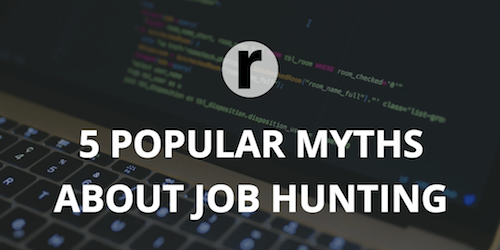
What's holding you back from finding a job? Is it the fear that there are more professional candidates competing for vacancies? Or is it the belief that you have to pull strings in order to win the position? Lucky for you, these are all just myths!
The team at Resumance decided to, once and for all, debunk 5 of the most common myths and misconceptions about job-hunting that often prevent people from achieving success. It's time for you to rise to the occasion so read up!
Myth #1: The position goes to the most qualified candidate.
This is perhaps one of the most popular myths about job-hunting. A lot of people believe that an employer seeks for the most qualified candidate with the best combination of professional skills and job experience. While this is somewhat true, the employer is, in fact, looking for someone based on a whole range of factors, such as:
- communication skills
- personal traits and qualities
- cultural background
- the ability to present oneself in the interview and
- willingness and dedication to work for the company's success.
Remember that in an interview, it's best to not present yourself as arrogant and overly confident, even when you feel you're the most qualified for the job. At the same time, you shouldn't worry if you know that you lack skills and experience. After all, you will eventually gain them along the way. At this point, it's better to make every effort to show yourself to a potential employer that you're the perfect fit and that they won't regret hiring you.
Myth #2: You are more likely to get the job if you reduce your expected salary requirement.
Oftentimes applicants think that, by lowering their expected salary level, they'll have higher chances to get hired. But this is not true. When opening a vacancy, cutting costs or saving money isn't a company's initial concern. Rather, their top priority is to look for a professional who is best suited for - and can cope with - the job at hand.
While your salary requirement should remain within the average figures on the market, the employer will choose someone from among many candidates based on their personal and professional qualities. In some instances, if you greatly reduce your salary level, you'll appear as if you're desperately looking for a job, and the employer might suspect that, for some reason, you're not in-demand as an expert.
Myth #3: It's enough to have only one resume for all job applications.
A lot of applicants believe that it's enough to make a resume once and make updates from time-to-time. This is a great misconception. According to various statistics, a recruiter spends no more than 20 seconds to go through an applicant's resume. This means you need to impress them and grab their attention during these precious seconds.
Visual presentation of information is ever-changing. Text that was written 5 years ago may not be as appealing to employers as it was before. While you don't have to constantly rewrite your resume every year, it's worth keeping a close eye on the latest trends in the job market, and to keep yourself updated with the latest techniques, such as making an infographic resume.
Additionally, it's not bad to make a few adjustments to your resume, for it to fit a company's requirements. For example, you may want to make some changes to the template or shift the emphasis on your skills and experience, depending on where you submit the resume to. A lot of employers pay attention to how you adjusted your CV specifically for their company, their requirements, and their style of work. Obviously, it would be difficult to get a job in an advertising agency if your resume is tailored for a vacancy in an international organization.
Myth #4: Employers don't hire unemployed individuals.
Oftentimes people who quit or lose their job go into a standstill because of this myth. They believe that finding or shifting to a different job will be difficult if they don't currently occupy some position. Likewise, their efforts would be futile if they had to stay out of work.
However, employers are not automated machines. They, too, are humans who perfectly understand that being in such a situation can't entirely be blamed to the person. If you give it your all and show yourself as a strong contender during the interview, then sure enough the employer won't focus too much on the reason you're currently unemployed.
Still, it's better to make some clarifications and inform them of the reason for your dismissal. Additionally, tell them how you spent the period of unemployment on self-development (for example, you attended profile courses and seminars, training, continued to monitor changes in your field, etc.).
Myth #5: You need to pull some strings in order to get a decent job.
This myth arises when some individuals try to justify their passiveness and just want to find a shortcut to getting their dream job. Every day, thousands of offers from various companies appear in job listings and directories. But roughly half of employers and recruiters are looking for candidates in the resume base, even before the job placement.
But even through friends and acquaintances, you can find out about vacancies which the company probably hasn't even posted online yet. Nowadays, however, more and more companies are practicing several stages of the interview. Through this process, non-professional candidates are eliminated at every stage of the multilevel interview.
Posted by Abigail Jackson
Abigail Jackson is the Editor-in-Chief at Resumance. After earning her degree in Psychology and working for several years as a career adviser, she is now working as an independent career consultant and a seasoned resume writer. You can get in touch with Abigail on Twitter @theresumance.


Comments